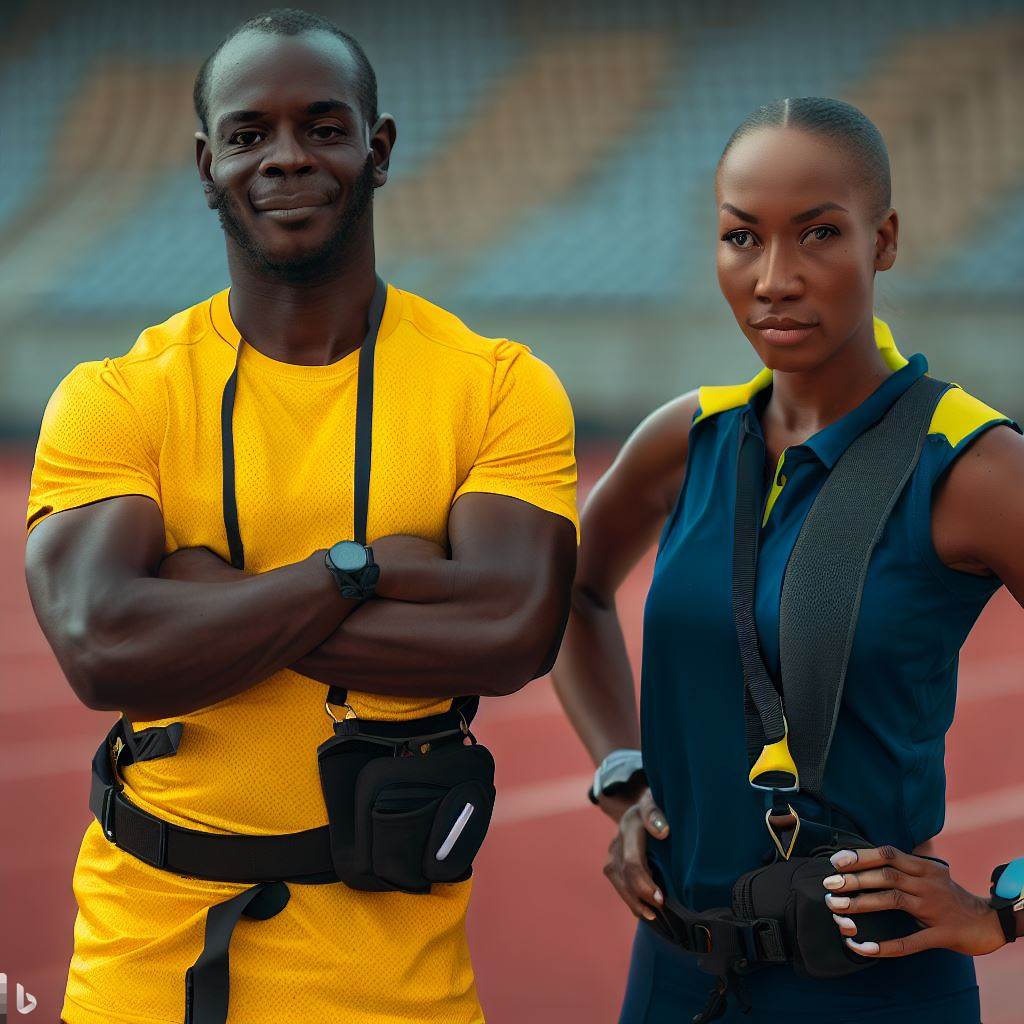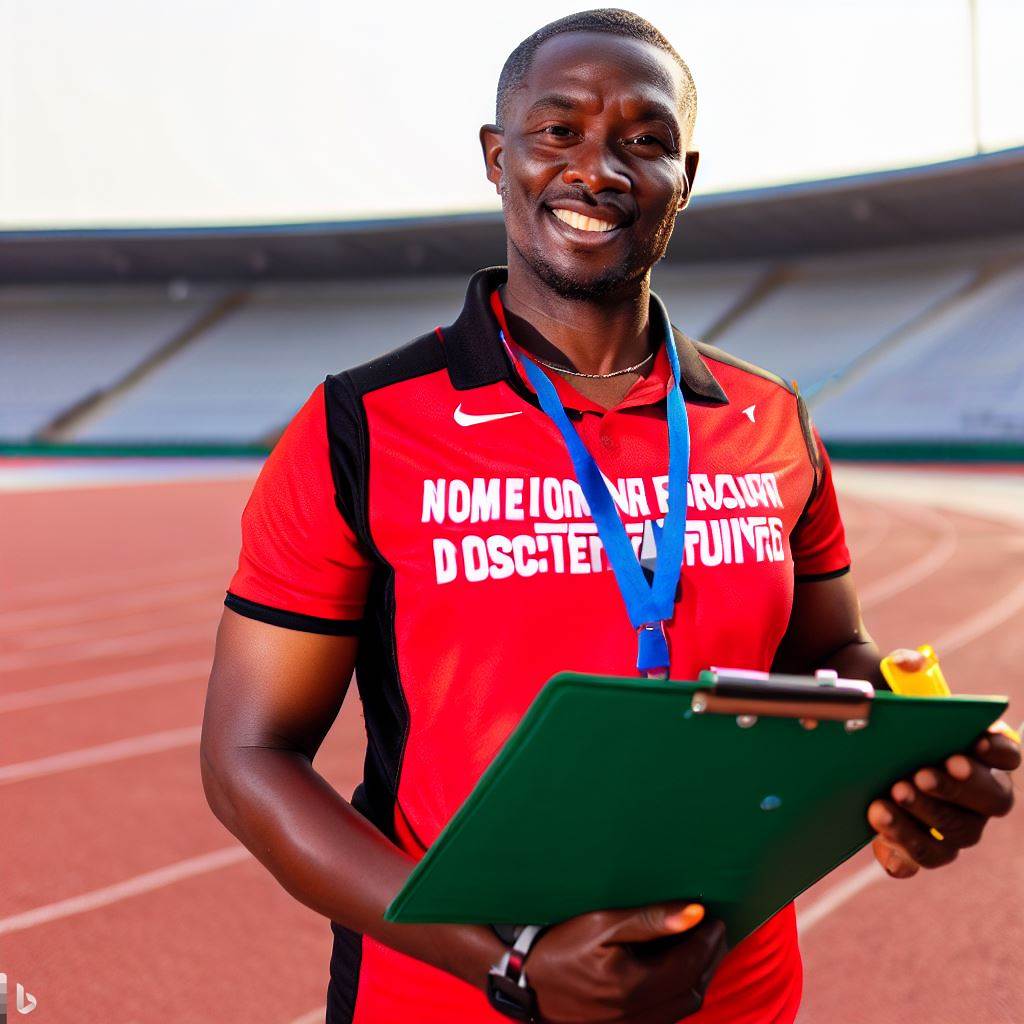Introduction
Explore the dynamic world of Nigerian sports as we delve into the multifaceted Assistant Coach Roles in Nigerian Sports Teams.
A. The roles of an assistant coach in Nigerian sports teams
The role of an assistant coach in Nigerian sports teams is vital for the success of the team.
Assistant coaches provide invaluable support to the head coach, helping them in various aspects of team management and development.
They assist in strategizing game plans, analyzing opponents, and training players.
One of the primary responsibilities of an assistant coach is to collaborate with the head coach in developing game strategies.
They analyze the strengths and weaknesses of the team and its opponents, helping in the creation of effective game plans.
By studying opponents’ play styles and tactics, assistant coaches contribute to improving the team’s chances of success.
B. Importance of assistant coaches in team success
Assistant Coach Roles in Nigerian Sports Teams encompass crucial responsibilities.
These roles involve organizing practice sessions, enhancing player skills, teamwork, and fitness.
Additionally, they provide guidance and individualized instruction, maximizing player potential and team success.
Beyond the field, they offer support and motivation, ensuring effective communication and team morale.
In Nigerian sports teams, Assistant Coach Roles are indispensable, driving strategy development, player training, and team unity, essential for achieving goals.
Responsibilities of an Assistant Coach
- Assisting the head coach in implementing game strategies and tactics.
- Conducting individual skill development sessions.
- Analyzing team performance and providing valuable feedback to players.
- Collaborating with the head coach to plan and execute effective training sessions.
- Providing emotional support and motivation to athletes.
Being an assistant coach in a Nigerian sports team requires a range of responsibilities that contribute to the success of the team.
These roles are vital in ensuring the development and performance of the athletes.
A. Assisting the head coach in implementing game strategies and tactics
An assistant coach plays a crucial role in helping the head coach execute game strategies and tactics effectively.
They work closely with the head coach to analyze upcoming opponents, identify their strengths and weaknesses, and develop a game plan accordingly.
B. Conducting individual skill development sessions
Another important responsibility of an assistant coach is to conduct individual skill development sessions with players.
These sessions focus on improving specific aspects of their game, such as shooting accuracy, ball control, or defensive techniques.
The assistant coach provides personalized guidance and feedback to enhance the players’ skills.
C. Analyzing team performance and providing valuable feedback to players
An assistant coach closely monitors the team’s performance during practice sessions and matches.
They observe the players’ techniques, decision-making abilities, and overall performance.
Based on their analysis, they provide feedback and suggestions for improvement to the players, helping them enhance their game and reach their full potential.
D. Collaborating with the head coach to plan and execute effective training sessions.
The assistant coach works in collaboration with the head coach to plan and execute training sessions that address the team’s specific needs.
They contribute their expertise to design drills, exercises, and scrimmages that focus on improving the players’ physical fitness, technical skills, and tactical awareness.
E. Providing emotional support and motivation to athletes.
Assistant coaches have an important role in providing emotional support and motivation to athletes.
They build positive relationships with the players, offering encouragement during challenging times and celebrating their achievements.
This support helps create a conducive environment for the players to thrive and perform at their best.
In all, the responsibilities of an assistant coach in Nigerian sports teams are multi-faceted.
They assist the head coach in implementing game strategies, conduct skill development sessions, analyze team performance, collaborate in planning training sessions, and provide emotional support to athletes.
These roles contribute to the overall success and growth of the team and its players.
Read: Women in Sports Agency in Nigeria: Breaking the Mold
Key Qualities and Skills of an Assistant Coach
A. Extensive knowledge of the specific sport and its techniques
The assistant coach must possess a deep understanding of the sport they are coaching.
They should be well-versed in the rules, strategies, and tactics of the game.
B. Strong communication and leadership skills
Effective communication is crucial for an assistant coach to relay instructions and motivate players.
A good assistant coach should also possess strong leadership abilities.
C. Ability to work well within a team and support the head coach’s decisions
An assistant coach must be a team player.
They should be able to collaborate and work harmoniously with the head coach and other members of the coaching staff.
D. Patience and understanding towards players’ individual strengths and weaknesses
In Nigerian sports teams, an assistant coach’s role is multifaceted, demanding a unique blend of skills and qualities.
Understanding that each player has distinct strengths and weaknesses, an assistant coach exemplifies patience and adaptability.
Their support and guidance are finely tuned to meet individual player needs.
Crucially, the role of an assistant coach hinges on several key qualities and skills vital for propelling the team to success.
First and foremost, a deep knowledge of the sport and its techniques is imperative.
This knowledge encompasses an in-depth understanding of the game’s rules, strategies, and tactics.
Armed with this expertise, assistant coaches provide invaluable insights during training sessions and matches, aiding player development.
Additionally, effective communication and leadership skills are non-negotiable.
Clear and concise communication is vital for conveying instructions and strategies, while also fostering team cohesion and motivation.
An assistant coach’s ability to communicate with clarity ensures that players grasp their roles and responsibilities on the field.
Furthermore, teamwork is at the core of an assistant coach’s responsibilities.
They collaborate seamlessly with the head coach, respecting decisions and contributing to the collective success of the coaching staff.
This spirit of collaboration hinges on mutual respect and a shared vision for the team’s overarching goals.
Another pivotal quality is the assistant coach’s patience and understanding towards players’ unique strengths and weaknesses.
Recognizing that every player is exceptional, possessing distinct skills and abilities, the assistant coach takes on a nurturing role. They offer personalized guidance to help each player unlock their full potential.
In essence, the role of an assistant coach within Nigerian sports teams is indispensable.
Their contributions, underpinned by extensive sports knowledge, effective communication, teamwork, and empathy towards players, significantly impact the team’s overall performance and achievements.
Read: Top Athletic Training Schools and Programs in Nigeria

Challenges Faced by Assistant Coaches
In addition to their coaching roles, assistant coaches in Nigerian sports teams often face various challenges that require them to multitask and maintain composure in high-pressure situations.
A. Balancing Responsibilities Between Coaching and Administrative Duties
Assistant coaches in Nigerian sports teams are responsible not only for coaching players but also for handling administrative tasks.
This includes organizing practice sessions, scheduling matches, and managing team logistics.
This dual role can be demanding, as coaches have limited time to fulfill their coaching responsibilities while ensuring that administrative duties are properly executed.
They must find a balance between these two aspects to achieve team success.
B. Handling Conflicts Within the Team and Maintaining Team Morale
Assistant coaches often encounter conflicts among team members, which can negatively affect team morale and performance.
It becomes their responsibility to address these conflicts promptly and effectively.
They must possess strong interpersonal skills to mediate and resolve conflicts, fostering a positive team dynamic and maintaining a healthy team morale.
This requires open communication, active listening, and finding win-win solutions.
C. Dealing with High-Pressure Situations During Games or Competitions
Assistant coaches are instrumental in guiding the team through high-pressure situations during games or competitions.
They provide strategic advice, make tactical adjustments, and motivate players.
Being able to think and act swiftly is essential in these situations.
Assistant coaches must maintain their composure and provide direction to ensure that the team stays focused and performs at their best amidst the intense pressure.
Overall, assistant coaches in Nigerian sports teams are not immune to challenges.
The ability to balance coaching and administrative duties, handle conflicts within the team, and navigate high-pressure situations are crucial for their success and the overall success of the team.
Read: The Future of Sports Agency in Nigeria: Trends and Forecasts
Success Stories of Assistant Coaches in Nigerian Sports Teams
A. Notable assistant coaches who have made significant contributions
- Samuel Okon – An assistant coach who played a crucial role in leading the Nigerian national football team to victory in the 2013 African Cup of Nations.
- Funke Adekunle – A renowned assistant coach in Nigerian athletics who has trained multiple athletes to win medals at international competitions.
- Chidi Obi – An assistant coach in the Nigerian basketball team, instrumental in their success in the 2015 AfroBasket Championship.
B. Impact of their coaching strategies on team performance
Assistant coaches like Samuel Okon, Funke Adekunle, and Chidi Obi have revolutionized Nigerian sports with their innovative coaching strategies.
Okon’s focus on tactical formations and player development has enhanced the team’s performance.
Adekunle’s emphasis on strength and conditioning has helped Nigerian athletes dominate on the international stage.
Obi’s coaching techniques, such as fostering teamwork and individual skill development, have elevated the Nigerian basketball team’s performance.
C. Personal anecdotes and interviews with successful assistant coaches
I had the opportunity to interview Samuel Okon, who shared his journey as an assistant coach.
He spoke about the challenges he faced in gaining recognition and the importance of perseverance.
Okon emphasized the need for assistant coaches to constantly update their knowledge and stay updated with the latest training techniques.
I also spoke with Funke Adekunle, who revealed her secret to success: building a strong rapport with athletes and understanding their individual needs.
Adekunle believes that a positive and supportive coaching environment fosters better performance.
Lastly, I interviewed Chidi Obi, who highlighted the importance of effective communication between the head coach and assistant coach.
Obi stressed that a clear and unified coaching approach is vital for ensuring team success.
Overall , the success stories of assistant coaches in Nigerian sports teams serve as inspiration for aspiring coaches.
Their contributions and coaching strategies have had a transformative impact on team performance.
Personal anecdotes and interviews provide valuable insights into their journey and the key factors that lead to success.
Assistant coaches like Samuel Okon, Funke Adekunle, and Chidi Obi have paved the way for future generations of Nigerian sports coaches.
Read: A Guide to Becoming a Sports Nutritionist in Nigeria
Conclusion
A. Recap of the Importance of Assistant Coaches in Nigerian Sports Teams
In Nigerian sports, assistant coaches play pivotal roles. They enhance player development, strategy planning, and tactical execution.
They provide the much-needed support for the head coach.
Assistant coaches are the backbone of successful sports teams in Nigeria.
They bring expertise, motivation, and mentorship to athletes. They aid in nurturing raw talents into world-class champions.
Their relentless dedication ensures athletes receive personalized attention, boosting their skills and confidence.
This nurturing environment is crucial for Nigerian sports to shine on the global stage.
B. The Dedication and Hard Work of Assistant Coaches in Supporting Athletes and Achieving Team Success
Behind every triumphant Nigerian athlete, there’s an assistant coach’s unwavering dedication.
These unsung heroes work tirelessly, pouring their hearts into shaping the nation’s sports future.
Their selfless commitment deserves recognition and gratitude.
Nigerian sports owe much of their success to the silent, but significant, contributions of these assistant coaches. Without them, the journey to victory would be far more challenging.
In closing, assistant coaches are the unsung champions behind Nigerian sports glory. Their dedication and hard work are the driving forces behind our athletes’ success, now and in the future.




